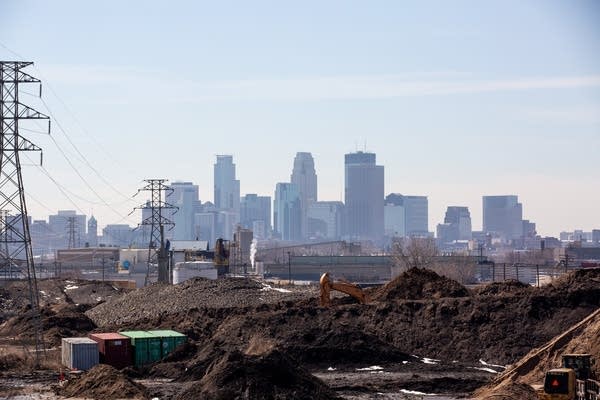Timeline: A history of North Minneapolis' Upper Harbor Terminal site

Go Deeper.
Create an account or log in to save stories.
Like this?
Thanks for liking this story! We have added it to a list of your favorite stories.
By Melissa Townsend and Kenzie O'Keefe, for MPR News
The 48-acre parcel of land known as the Upper Harbor Terminal site is currently owned by the city of Minneapolis. The site, located on the Mississippi River in north Minneapolis, was originally on Dakota land until the United States government took it and other land through the treaties at Traverse des Sioux and Mendota in 1851. There have been many uses of the land since, including lumber yards, mills, a commercial garden and a barge terminal.
Here’s a look at the history of the site and its development through the years.
1968-2014
The Upper Harbor Terminal site is developed as an intermodal barge shipping terminal. It closes in 2014 when barging ceased due to the planned closure of the Upper St. Anthony Falls Lock in 2015.
Turn Up Your Support
MPR News helps you turn down the noise and build shared understanding. Turn up your support for this public resource and keep trusted journalism accessible to all.

2015
Upper Harbor Terminal community engagement begins.
August 2016
The City of Minneapolis and Minneapolis Park and Recreation Board issue a Request for Qualifications seeking a development team to work with those agencies and the community on the first phase of redevelopment. The only submission is from the development team of United Properties, Thor Construction and First Avenue.
January 2017
City council and the park and recreation board select United Properties to redevelop the site.
November 2017
Both north side city council incumbents are defeated by political newcomers Phillipe Cunningham in the 4th Ward and Jeremiah Ellison in the 5th Ward. Jacob Frey becomes mayor.
May 2018
City secures $15 million in state bonding for infrastructure improvements to the site.
September/October 2018
Residents organize the Eco-Harbor Co-creation team to envision an alternative plan for the site.
February 2019
City councilmembers are scheduled to vote on the concept plan, but the vote is pushed back.
March 1, 2019
The City Council approves an amended concept plan. It includes a direction to create a first-of-its-kind community advisory committee to guide the project.

April 2019
Thor Companies shuts down due to financial trouble.
May 17, 2019
Minneapolis City Council establishes a 17-member Upper Harbor Terminal Collaborative Planning Committee to work with the project team on community engagement, refinement of the Phase 1 development plan and visions for future development phases. Members are north and northeast Minneapolis community members.
June 2019
The Collaborative Planning Committee begins meeting.
July 2019
The advisory committee for the portion of the nearly 20-acre park of Upper Harbor Terminal begins meeting monthly.
“Learning tables” about the UHT begin being hosted monthly, during which community members explore aspects of the project development and talk about what they want from development.

Next steps in 2020
February
The Collaborative Planning Committee will create three possible plans for development in partnership with the development team. The development team will then conduct a feasibility analysis of the three plans. One plan will be put forth for public comment in March.
March
The city of Minneapolis anticipates making a request for $20 million in state bonding from the Minnesota Legislature to build a proposed music venue on the site.
April/May
Public input is scheduled on the possible coordinated plan for the site.
June/early July
City Council is expected to vote on the coordinated plan.
December 2021
Deadline to begin spending $15 million in state funding awarded to the city in 2018. If the city has not started to spend the money, legislators will need to approve an extension.


